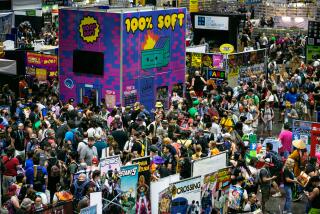Downtown L.A. Merchants Tote Up Lost Business
- Share via
Hoteliers have yet to tally their take from this week’s Democratic National Convention, but most downtown merchants already have emerged as clear losers.
From fashion district wholesalers to Bunker Hill restaurants, boarded-up gold and gem retailers and Broadway’s discount stores, the verdict is in: The convention was worse than a bust. Not only did the bonus $132-million injection into the local economy promised by city officials fail to materialize for most downtown business owners, they lost their bread-and-butter customers when thousands of fearful workers and window-shoppers stayed away.
Estimates of lost business topped tens of millions of dollars for jewelry district retailers who boarded up shops and rolled down metal security doors during the convention.
Restaurants and other retailers saw daily revenues shrink up to 70%. Many closed early, leaving workers with smaller paychecks. Most saw their regular customers diminish to a trickle, and neither delegates nor protesters made up for the blow.
“They came in for water and to use the bathroom. . . . We got killed because of this,” said Henry Fogiel, owner of the Yorkshire Grill on West 6th Street near Grand Avenue, who suffered a 40% plunge in revenue.
“[Mayor] Richard Riordan said we’d make [$132] million,” Fogiel said. “Well, maybe the city did, but not the people downtown.”
By Thursday, some jewelry merchants and restaurants timidly unrolled their security gates for the first time all week, while other wholesalers and manufacturers returned to work in the upper floors of the tightly secured jewelry district marts.
The manager of the Sultan restaurant, which caters to the district’s merchants, opened briefly Wednesday but was forced to toss out $700 worth of meat that had spoiled, bringing losses into the “thousands of dollars.” By Thursday he was offering a limited menu of three items.
Key to the problems were fears of rioting. Although demonstrations were largely peaceful, the anxiety over a melee like the one in Seattle during December’s World Trade Organization summit and the aggressive police presence scared away would-be shoppers and kept as many as 65% of Bunker Hill’s corporate workers away.
That left upscale clothiers such as AnnTaylor, at Seventh Marketplace, and Brooks Bros. without their core customers.
Merchants closer to the protest center at Pershing Square faced bigger problems.
Many said police advised them to close up until today to avoid potential trouble from protests.
“The police came door to door and scared the daylights out of us, and so did the property managers,” said Haim Morovati of Silver City, a jewelry wholesaler who came to work anyway and made do with early United Parcel Service schedules and shortened bank hours.
A Los Angeles Police Department spokesman Thursday insisted that the department’s official stance was never to encourage closures, although individual officers may have done so.
City Councilwoman Jackie Goldberg--criticized by some merchants for bringing the protesters downtown--placed the blame for the economic dead zone on police and Riordan.
“You can’t have the mayor and the police chief for at least three weeks before the convention starts tell everyone what a frightening situation this is and how we practically have to declare martial law and expect people not to be afraid,” she said.
Carol Schatz, president of the Central City Assn., blamed the problems instead on the fact that demonstrators were allowed downtown in the first place.
“If it wasn’t for that focus on protest it would have been an entirely different story,” Schatz said. Although she had yet to survey downtown businesses overall, losses to the jewelry district were “very, very substantial,” she said.
Finger-pointing aside, what emerged Thursday was a gloomy economic picture for a broad swatch of downtown.
Fearing violence during an anti-sweatshop march Thursday, dozens of downtown garment contractors closed for the day. The workers, who are paid by piecework, said the closure would cost each of them a day’s pay--about $35.
“It’s good to see them marching but we really need the money. It’s hard to miss a day,” said Rocio Alaniz, a seamstress for nine years who works at 8th and Maple streets.
The city’s fashion district also suffered a dip in wholesale and retail sales.
“There was so much hype about the disruptions . . . that a lot of consumers and a lot of buyers decided, ‘Let’s give this week a rest,’ ” said Kent Smith, executive director of the Fashion District Business Improvement District. “Not only didn’t we see tourists this week, we didn’t see the everyday L.A. shopper.”
Employees at the Downtown Car Wash across the street from Staples Center saw their hours slashed by slowed business. The carwash lost even more revenue as it honored discounts requested by the Democratic National Committee, police and Secret Service officials in exchange for their business, said manager Monte Peterson. He estimated business overall was down about 70%.
Down the street at Olympic Boulevard and Broadway, Julio Cesar Ingles’ Restaurant Bocata Yes saw daily revenue shrink from $1,000 to about $600.
“There are no people,” said Ingles, gesturing at the barren sidewalk outside, where garment district workers on lunch breaks and other locals usually stroll.
Across downtown, in fact, some of the grimmest news came from restaurants, which had looked to high hotel occupancy as a sign of better business during convention week but were disappointed. Some were able to make up for the losses by hosting private parties.
“It’s just not what we expected,” said Craig Cutler, manager of Engine Co. No. 28 on Figueroa Street. “Everyone was hoping for a piece of the pie, and it hasn’t been that way.”
*
Times staff writer Nancy Cleeland contributed to this report.
More to Read
Get the L.A. Times Politics newsletter
Deeply reported insights into legislation, politics and policy from Sacramento, Washington and beyond. In your inbox twice per week.
You may occasionally receive promotional content from the Los Angeles Times.











